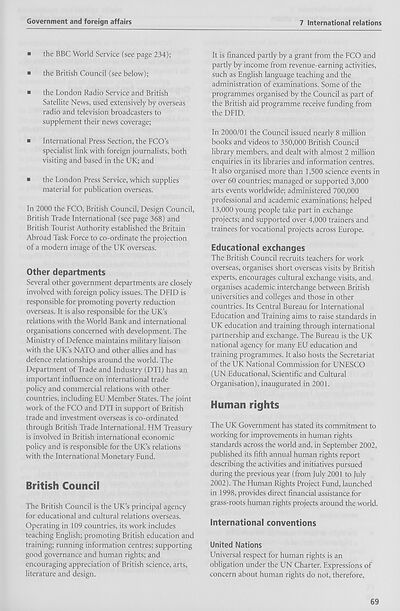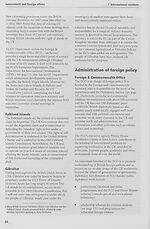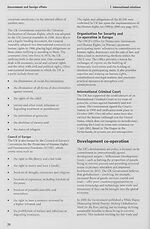Download files
Complete book:
Individual page:
Thumbnail gallery: Grid view | List view

Government and foreign affairs
7 International relations
■ the BBC World Service (see page 234);
■ the British Council (see below);
■ the London Radio Service and British
Satellite News, used extensively by overseas
radio and television broadcasters to
supplement their news coverage;
■ International Press Section, the FCO’s
specialist link with foreign journalists, both
visiting and based in the UK; and
■ the London Press Service, which supplies
material for publication overseas.
In 2000 the FCO, British Council, Design Council,
British Trade International (see page 368) and
British Tourist Authority established the Britain
Abroad Task Force to co-ordinate the projection
of a modern image of the UK overseas.
Other departments
Several other government departments are closely
involved with foreign policy issues. The DFID is
responsible for promoting poverty reduction
overseas. It is also responsible for the UK’s
relations with the World Bank and international
organisations concerned with development. The
Ministry of Defence maintains military liaison
with the UK’s NATO and other allies and has
defence relationships around the world. The
Department of Trade and Industry (DTI) has an
important influence on international trade
policy and commercial relations with other
countries, including EU Member States. The joint
work of the FCO and DTI in support of British
trade and investment overseas is co-ordinated
through British Trade International. HM Treasury
is involved in British international economic
policy and is responsible for the UK’s relations
with the International Monetary Fund.
British Council
The British Council is the UK’s principal agency
for educational and cultural relations overseas.
Operating in 109 countries, its work includes
teaching English; promoting British education and
training; running information centres; supporting
good governance and human rights; and
encouraging appreciation of British science, arts,
literature and design.
It is financed partly by a grant from the FCO and
partly by income from revenue-earning activities,
such as English language teaching and the
administration of examinations. Some of the
programmes organised by the Council as part of
the British aid programme receive funding from
the DFID.
In 2000/01 the Council issued nearly 8 million
books and videos to 350,000 British Council
library members, and dealt with almost 2 million
enquiries in its libraries and information centres.
It also organised more than 1,500 science events in
over 60 countries; managed or supported 3,000
arts events worldwide; administered 700,000
professional and academic examinations; helped
13,000 young people take part in exchange
projects; and supported over 4,000 trainers and
trainees for vocational projects across Europe.
Educational exchanges
The British Council recruits teachers for work
overseas, organises short overseas visits by British
experts, encourages cultural exchange visits, and
organises academic interchange between British
universities and colleges and those in other
countries. Its Central Bureau for International
Education and Training aims to raise standards in
UK education and training through international
partnership and exchange. The Bureau is the UK
national agency for many EU education and
training programmes. It also hosts the Secretariat
of the UK National Commission for UNESCO
(UN Educational, Scientific and Cultural
Organisation), inaugurated in 2001.
Human rights
The UK Government has stated its commitment to
working for improvements in human rights
standards across the world and, in September 2002,
published its fifth annual human rights report
describing the activities and initiatives pursued
during the previous year (from July 2001 to July
2002). The Human Rights Project Fund, launched
in 1998, provides direct financial assistance for
grass-roots human rights projects around the world.
International conventions
United Nations
Universal respect for human rights is an
obligation under the UN Charter. Expressions of
concern about human rights do not, therefore,
69
7 International relations
■ the BBC World Service (see page 234);
■ the British Council (see below);
■ the London Radio Service and British
Satellite News, used extensively by overseas
radio and television broadcasters to
supplement their news coverage;
■ International Press Section, the FCO’s
specialist link with foreign journalists, both
visiting and based in the UK; and
■ the London Press Service, which supplies
material for publication overseas.
In 2000 the FCO, British Council, Design Council,
British Trade International (see page 368) and
British Tourist Authority established the Britain
Abroad Task Force to co-ordinate the projection
of a modern image of the UK overseas.
Other departments
Several other government departments are closely
involved with foreign policy issues. The DFID is
responsible for promoting poverty reduction
overseas. It is also responsible for the UK’s
relations with the World Bank and international
organisations concerned with development. The
Ministry of Defence maintains military liaison
with the UK’s NATO and other allies and has
defence relationships around the world. The
Department of Trade and Industry (DTI) has an
important influence on international trade
policy and commercial relations with other
countries, including EU Member States. The joint
work of the FCO and DTI in support of British
trade and investment overseas is co-ordinated
through British Trade International. HM Treasury
is involved in British international economic
policy and is responsible for the UK’s relations
with the International Monetary Fund.
British Council
The British Council is the UK’s principal agency
for educational and cultural relations overseas.
Operating in 109 countries, its work includes
teaching English; promoting British education and
training; running information centres; supporting
good governance and human rights; and
encouraging appreciation of British science, arts,
literature and design.
It is financed partly by a grant from the FCO and
partly by income from revenue-earning activities,
such as English language teaching and the
administration of examinations. Some of the
programmes organised by the Council as part of
the British aid programme receive funding from
the DFID.
In 2000/01 the Council issued nearly 8 million
books and videos to 350,000 British Council
library members, and dealt with almost 2 million
enquiries in its libraries and information centres.
It also organised more than 1,500 science events in
over 60 countries; managed or supported 3,000
arts events worldwide; administered 700,000
professional and academic examinations; helped
13,000 young people take part in exchange
projects; and supported over 4,000 trainers and
trainees for vocational projects across Europe.
Educational exchanges
The British Council recruits teachers for work
overseas, organises short overseas visits by British
experts, encourages cultural exchange visits, and
organises academic interchange between British
universities and colleges and those in other
countries. Its Central Bureau for International
Education and Training aims to raise standards in
UK education and training through international
partnership and exchange. The Bureau is the UK
national agency for many EU education and
training programmes. It also hosts the Secretariat
of the UK National Commission for UNESCO
(UN Educational, Scientific and Cultural
Organisation), inaugurated in 2001.
Human rights
The UK Government has stated its commitment to
working for improvements in human rights
standards across the world and, in September 2002,
published its fifth annual human rights report
describing the activities and initiatives pursued
during the previous year (from July 2001 to July
2002). The Human Rights Project Fund, launched
in 1998, provides direct financial assistance for
grass-roots human rights projects around the world.
International conventions
United Nations
Universal respect for human rights is an
obligation under the UN Charter. Expressions of
concern about human rights do not, therefore,
69
Set display mode to:
![]() Universal Viewer |
Universal Viewer | ![]() Mirador |
Large image | Transcription
Mirador |
Large image | Transcription
The item on this page appears courtesy of Office for National Statistics and may be re-used under the Open Government Licence for Public Sector Information.
| Britain and UK handbooks > UK: The official yearbook of the United Kingdom of Great Britain and Northern Ireland > 2003 > (91) |
|---|
| Permanent URL | https://digital.nls.uk/204924290 |
|---|
| Attribution and copyright: |
|
|---|---|
| Description | Three volumes of 'UK: The official yearbook of the United Kingdom of Great Britain and Northern Ireland', published annually by the Office of National Statistics from 2002-2005. |
|---|---|
| Shelfmark | GII.11 SER |
| Description | Three titles produced by the British Government from 1954-2005 describing 'how Britain worked'. They are: 'Britain: An official handbook' (1954-1998), 'Britain: The official yearbook of the United Kingdom' (1999-2001), and 'UK: The official yearbook of the United Kingdom of Great Britain and Northern Ireland' (2002-2005). These 50 reports provide an overview of Britain's economic, social and cultural affairs, its environment, international relations, and the systems of government. They give an impartial summary of government policies and initiatives, and explain how public services are organised. |
|---|---|
| Additional NLS resources: |
|

